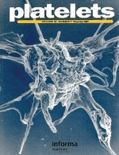
PLATELETS
Scope & Guideline
Advancing platelet science for a healthier tomorrow.
Introduction
Aims and Scopes
- Platelet Function and Mechanisms:
Research on the fundamental roles of platelets in hemostasis and thrombosis, including activation pathways, aggregation mechanisms, and interactions with other blood components. - Clinical Applications and Therapeutics:
Studies investigating the efficacy and safety of antiplatelet therapies, platelet transfusions, and emerging treatments for conditions like immune thrombocytopenia and thrombotic disorders. - Platelet Pathophysiology in Disease:
Exploration of the involvement of platelets in various diseases, including cancer, infections, cardiovascular diseases, and immune disorders. - Technological Innovations in Platelet Research:
Development and application of novel methodologies and technologies, such as mass cytometry and microfluidic systems, to study platelet behavior and function. - Genetics and Molecular Biology of Platelets:
Investigations into genetic factors influencing platelet function and disorders, including studies on inherited thrombocytopenias and molecular signaling pathways.
Trending and Emerging
- Platelet Extracellular Vesicles and Microvesicles:
An increased focus on the roles of platelet-derived extracellular vesicles in communication and pathology, particularly in cancer and inflammatory diseases, highlighting their potential as biomarkers and therapeutic targets. - Personalized Antiplatelet Therapy:
Emerging research on tailoring antiplatelet therapy based on individual patient characteristics, including genetic factors and specific clinical settings, to improve treatment outcomes. - Platelets in Infectious Diseases and COVID-19:
Growing interest in the role of platelets in infectious diseases, particularly in the context of COVID-19, where their involvement in coagulopathy and immune responses is being actively explored. - Platelet-Mediated Immunity:
An increasing recognition of platelets as active participants in immune responses, with studies investigating their interactions with immune cells and implications in autoimmune conditions. - Technological Advances in Platelet Research:
Significant advancements in technologies such as single-cell analysis, high-throughput sequencing, and microfluidics are enabling more nuanced studies of platelet biology and function.
Declining or Waning
- Basic Hematology and Platelet Count Studies:
Research focusing primarily on basic hematological parameters and platelet counts, which has decreased in favor of more complex studies involving platelet function and molecular mechanisms. - Platelet Role in Traditional Hematological Disorders:
Topics related to classic hematological conditions, such as simple thrombocytopenias without a thorough understanding of underlying mechanisms, are becoming less frequent. - Animal Model Studies:
While animal model studies are still important, there is a noticeable decline in the publication of papers solely focused on basic animal model findings without translational implications.
Similar Journals

JOURNAL OF THROMBOSIS AND THROMBOLYSIS
Advancing knowledge in thrombosis and thrombolysis.JOURNAL OF THROMBOSIS AND THROMBOLYSIS, published by Springer in the Netherlands, serves as a vital platform for research in the fields of Cardiology and Cardiovascular Medicine and Hematology. With an impressive impact factor, this journal ranks in the Q2 category for both fields according to the latest metrics, evidencing its significant influence and contribution to ongoing scholarly discourse. Spanning over three decades from 1994 to 2024, the journal provides an essential source for innovative studies, clinical practices, and comprehensive reviews related to thrombosis and thrombolysis. Researchers, clinicians, and students alike will find valuable insights and cutting-edge knowledge that address the complexities of blood coagulation and its implications in cardiovascular health. The journal is indexed in Scopus, with commendable rankings, further establishing its reputation in the academic community.
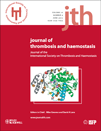
JOURNAL OF THROMBOSIS AND HAEMOSTASIS
Leading the Way in Hematology InnovationJOURNAL OF THROMBOSIS AND HAEMOSTASIS, published by Elsevier Science Inc, stands at the forefront of research in the fields of hematology and medicine, boasting an impressive ranking of #5 out of 137 in Scopus's Medicine - Hematology category, with a remarkable 96th percentile. As an essential resource for researchers, clinicians, and students, this journal, identifiable through its ISSN 1538-7933 and E-ISSN 1538-7836, encompasses pioneering studies and reviews that focus on the mechanisms of thrombosis and hemostasis, contributing significantly to advancements in patient care and therapeutic strategies. With an established presence from 2003 through 2024, it has consistently achieved a prestigious Q1 category ranking, reflecting its impactful contributions to the scientific community. Although it operates under a subscription-based model, the journal remains committed to disseminating significant findings that inform best practices in clinical settings and shape future research trajectories.
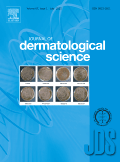
JOURNAL OF DERMATOLOGICAL SCIENCE
Shaping Tomorrow's Dermatological DiscoveriesThe Journal of Dermatological Science is a premier peer-reviewed publication dedicated to advancing knowledge in the field of dermatology, biochemistry, and molecular biology. Established in 1990 and published by Elsevier Ireland Ltd, this esteemed journal has consistently achieved high academic recognition, securing a Q1 ranking in Dermatology and a Q2 ranking in both Biochemistry and Molecular Biology as of 2023. With a notable impact factor and a Scopus rank that places it within the top tier of dermatology journals globally, it serves as a critical platform for researchers, clinicians, and academicians to disseminate their findings and foster innovation in skin health and disease management. Although the journal is not open access, it provides essential insights into cutting-edge research, clinical practices, and molecular mechanisms underlying dermatological conditions. The Journal of Dermatological Science is not only a vital resource for high-quality articles but also a driving force in shaping the future landscape of dermatological research.

Immunity
Unraveling the mysteries of immunology and allergy.Immunity is a premier journal published by CELL PRESS that has positioned itself at the forefront of immunological research since its inception in 1994. With its ISSN 1074-7613 and E-ISSN 1097-4180, this prestigious journal is recognized for its significant contribution to the fields of Immunology, Allergy, and Infectious Diseases, consistently achieving a Q1 ranking in these categories as per 2023 metrics. The journal is highly esteemed within the academic community, holding impressive Scopus rankings—4th out of 344 in Infectious Diseases and 3rd in both Immunology and Immunology and Allergy—placing it in the 98th percentile. Although not an Open Access journal, it provides critical insights and research developments that empower researchers, healthcare professionals, and students alike. With a commitment to advancing scientific knowledge, Immunity is crucial for those interested in understanding immune responses and their implications for health and disease.
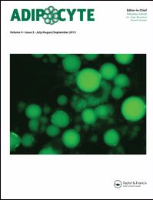
Adipocyte
Leading the Way in Adipose Tissue StudiesAdipocyte is a distinguished academic journal published by Taylor & Francis Inc., focusing on groundbreaking research within the realms of cell biology and histology. With an impact factor that reflects its importance, the journal has achieved a Q2 ranking in Cell Biology and a prestigious Q1 ranking in Histology for 2023, cementing its reputation as a leading resource for scientists and researchers in these fields. Since transitioning to Open Access in 2019, Adipocyte has fostered a wider dissemination of knowledge, enabling unrestricted access to a wealth of studies and reviews critical for advancing the understanding of adipose tissue biology. Located in the United Kingdom, with converged years spanning from 2013 to 2024, the journal serves as an essential platform for the exchange of innovative ideas and findings, supporting the academic community's efforts to unravel the complexities related to fat cells and their implications in health and disease.
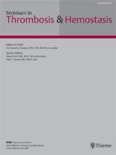
SEMINARS IN THROMBOSIS AND HEMOSTASIS
Exploring breakthroughs in cardiovascular and hematologic health.SEMINARS IN THROMBOSIS AND HEMOSTASIS is a prestigious academic journal dedicated to advancing the understanding and practice of thrombosis and hemostasis, published by THIEME MEDICAL PUBL INC. With an ISSN of 0094-6176 and an E-ISSN of 1098-9064, this journal plays a critical role in disseminating groundbreaking research and reviews in the fields of cardiology and hematology. As of 2023, it holds a commendable Q2 ranking in both the Cardiology and Cardiovascular Medicine and Hematology categories, with Scopus ranks of #55 out of 387 and #23 out of 137, respectively, positioning it within the top percentiles of these disciplines. The journal publishes articles that bring forth innovative findings and facilitate clinical applications, making it an essential resource for researchers, healthcare professionals, and students focused on improving patient care and outcomes. Since its inception in 1974, SEMINARS IN THROMBOSIS AND HEMOSTASIS continues to evolve with the changing landscape of medical research, striving to fill the gaps in knowledge and foster an informed approach to hemostatic disorders.
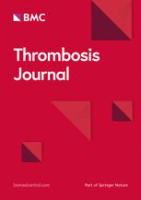
Thrombosis Journal
Advancing knowledge in thrombotic diseases.Thrombosis Journal is a pioneering open-access publication offering critical insights into the field of hematology, contributing significantly to the understanding of thrombotic diseases. Published by BMC since its inception in 2003, this journal stands out with its commitment to accessibility and dissemination of research, ensuring that valuable findings are readily available to the global scientific community. With an impressive Q2 ranking in the Hematology category as of 2023, the journal boasts a notable presence in the Scopus rankings, positioned at Rank #73/137 in its field. Researchers, healthcare professionals, and students can benefit from a rich array of articles that encompass clinical studies, reviews, and innovative methodologies, all aimed at advancing knowledge and fostering collaboration in the field. The journal is headquartered in the United Kingdom, and its open-access model has enabled a diversity of perspectives and research innovations to flourish, solidifying Thrombosis Journal as an essential resource for those dedicated to combating thrombotic disorders.

Molecular Neurodegeneration
Illuminating the pathways of neurodegeneration.Molecular Neurodegeneration is a leading journal published by BMC, dedicated to advancing the field of neurodegeneration through high-quality, open-access research. Since its inception in 2006, this peer-reviewed journal has provided a pivotal platform for the dissemination of innovative findings in the realms of Cellular and Molecular Neuroscience, Molecular Biology, and Clinical Neurology. With a stellar impact factor and listed in the prestigious Q1 category in multiple relevant categories, it ranks among the top publications in the field—specifically, it holds the #3 position in Neuroscience and #6 position in Clinical Neurology based on Scopus metrics. Researchers, professionals, and students alike will find significant value in the open access format, which fosters unrestricted sharing of knowledge, ensuring that emerging ideas in neurodegeneration reach a global audience. Based in London, United Kingdom, the journal promises a comprehensive scope that addresses critical questions in neurobiology, making it an essential resource for anyone interested in the molecular mechanisms underlying neurodegenerative diseases.

JOURNAL OF MOLECULAR MEDICINE-JMM
Advancing the Frontier of Molecular Medicine.JOURNAL OF MOLECULAR MEDICINE (JMM) is a premier publication dedicated to advancing the field of molecular medicine, encompassing critical areas such as drug discovery, genetics, and biochemistry. Published by Springer Heidelberg in Germany, this influential journal has established its significance within the academic community, achieving an impressive Q1 ranking across multiple categories as of 2023, including Drug Discovery, Clinical Genetics, and Molecular Medicine. With a focus on publishing high-quality research and novel insights, JMM appeals to a diverse audience of researchers, professionals, and students passionate about the molecular underpinnings of health and disease. The journal, which has seen a convergence of relevant research spanning from 1976 to 2024, is instrumental in showcasing groundbreaking studies that push the boundaries of knowledge in molecular therapeutics and biomedical science. While it does not offer open access, the rigor of its peer-reviewed content ensures that each publication is a valuable addition to the scientific discourse surrounding molecular medicine. For comprehensive studies and reviews that highlight the intersection of molecular biology and clinical application, look no further than JOURNAL OF MOLECULAR MEDICINE.
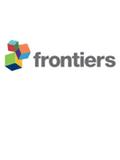
Frontiers in Molecular Neuroscience
Bridging gaps in knowledge to combat neurological challenges.Frontiers in Molecular Neuroscience, published by FRONTIERS MEDIA SA, is an esteemed open-access journal dedicated to advancing our understanding of the molecular mechanisms underlying neurological functions and disorders. Since its inception in 2008, the journal has established itself as a reputable source of cutting-edge research, earning a respectable Q2 ranking in both the fields of Cellular and Molecular Neuroscience and Molecular Biology as of 2023. With an ongoing commitment to fostering innovation, the journal presents a platform for researchers, professionals, and students to disseminate their findings and engage in scholarly discourse. The E-ISSN 1662-5099 ensures that research is readily accessible, facilitating the exchange of knowledge crucial to tackling the complexities of neurological conditions. Situated in Switzerland, the journal’s global reach is augmented by its open-access model, allowing for wide dissemination of critical research findings to a diverse audience. Join the vibrant community of scientists and practitioners who are shaping the future of molecular neuroscience through their contributions to this dynamic journal.